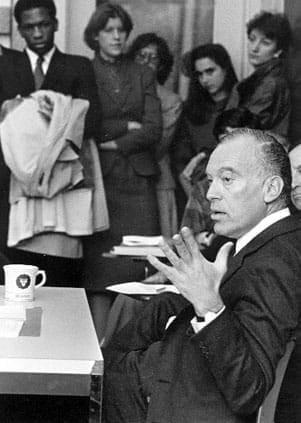 In an age of business arrogance and self-promotion, Leonard Lauder transformed a small, homey cosmetics company into a multibillion-dollar giant by deference and collegiality. Lauder realized that his mother, Estée Lauder, was the face of a business that was almost entirely about image. Though he took over Estée Lauder in 1972, when its sales were in the tens of millions of dollars, and turned it into that billion-plus cosmetics behemoth, he always introduced his mother as his inspiration, the one who made the company significant.
In an age of business arrogance and self-promotion, Leonard Lauder transformed a small, homey cosmetics company into a multibillion-dollar giant by deference and collegiality. Lauder realized that his mother, Estée Lauder, was the face of a business that was almost entirely about image. Though he took over Estée Lauder in 1972, when its sales were in the tens of millions of dollars, and turned it into that billion-plus cosmetics behemoth, he always introduced his mother as his inspiration, the one who made the company significant.
His great skill was to attend to details and know exactly whom his market was. He wanted the mid-to-high end customers, so he stayed in department stores while his competitors developed extensive drug-store distribution. When those department stores proliferated in the suburban mall boom of the 1970s and 1980s, Estée Lauder’s target customers also proliferated.
Lauder also believed in finding out who his employees were. He would travel extensively around the country, visiting Estée Lauder kiosks, introducing himself to sales clerks and stock people. He tested each of the company’s fragrances and was said to have the best nose in the business. He would have yearly retreats for middle managers, “Estée Lauder University,” and, those employees said, he would actually listen to their suggestions. Asked by the New York Times in 1987 if the approach was not a little paternalistic, he said, “I think that the concept of accusing someone of running a paternalistic company, that’s not an accusation. One should compliment someone on that.”
In 2006, Leonard Lauder (a former Penn Trustee) and his brother Ronald S. Lauder, W’65, the renowned diplomat, executive, and art collector, were recognized as Dean’s Medal recipients during commencement. The brothers, who founded the Joseph H. Lauder Institute of Management and International Studies at Penn in honor of their father, were honored for their commitment to global business and their belief that a serious interdisciplinary academic curriculum—combining business fundamentals with language proficiency, and international cultural, social, political and economic expertise—are vital to the growth of business worldwide. This year marks the 20th anniversary of Lauder’s first graduating class.


























